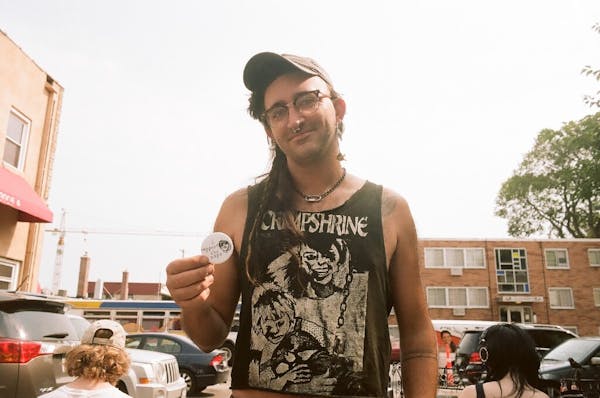Michael Cuddyer gets to fulfill a retirement wish Sunday at Target Field. He gets to watch — just watch — a ballgame.
"It's so much fun to watch baseball like a fan again," said the Twins' 1997 first-round draft pick, who walked away from the game in December. "For the last 15 years, I'd watch with a scout's eyes, watch the action on breaking pitches or where the hitter is trying to hit the ball. Because I'd know we were going to face these players in three months or whatever. So it's nice to be able to watch baseball the way I did when I was in high school."
Appropriate, since these days, Cuddyer lives, year-round, just a short drive from Great Bridge High near Virginia Beach, where he starred in the 1990s. He has given up the life of a big leaguer, choosing to spend his summer with wife Claudia and his three kids rather than play in Minnesota, Colorado or New York. Rather than face the Twins when they visit the Mets' Citi Field in September, he's in the Twin Cities this weekend to help celebrate the 25th anniversary of the Twins Community Fund.
It's a choice every ballplayer is forced to make at some point — but few choose to make it mid-contract.
The Mets owed Cuddyer $12.5 million, guaranteed, for the 2016 season, and the 15-year major league veteran intended to earn those paychecks when he signed the deal 18 months ago. But when the Mets' World Series run ended last November, Cuddyer realized something disheartening: He was tired of it all.
"Emotionally, my heart was with my family. Mentally, I just felt exhausted. And physically, I was beat up. I had core-muscle surgery after the World Series, and I was going to need to rehab from that before I could begin training for another 162 games," Cuddyer said. "I didn't feel like I had enough to give to be the player I expected myself to be and the team expected me to be. Could I have still produced? Yes, definitely. I could have gotten back into baseball shape, but I wasn't sure I could reach the level I expected of myself."
The decision was a surprising one, given that the Mets, with all their young pitching, are one of the favorites to return to the World Series. Cuddyer could have collected that $2 million a month and come along for the ride, even if he was in a sharply reduced role. But "usually when I get to the end of the season, I'm pretty beat up, but I still love the game, still love playing," Cuddyer said. "This time, that was gone. And I didn't want to hang on if I didn't love it."
He earned more than $75 million playing baseball, plus a reported buyout of more than $2 million for this season, and he reached the World Series, even if his role in it was a letdown: three at-bats in Game 1, and three strikeouts, capping a 1-for-11 postseason. But Cuddyer, who reached the playoffs six times in his 10-year Twins career, says he relishes the memory anyway.
"I got there. That's more than a lot of guys can say," Cuddyer said. "In 2002, when [the Twins] got to the ALCS, I was sure we'd get to the World Series a bunch of times. But it's tough. When you get there, you realize how many breaks you have to get along the way."
And he realizes how fortunate he is now. "I took my daughters [4-year-old twins Maddie and Chloe] to ice skating lessons yesterday," Cuddyer said. "I spoke to a management class at a college today. Tomorrow, I've got baseball practice for [7-year-old son] Casey. … I'm incredibly fortunate. I walked away, and I still get to do something I love."
AL CENTRAL INTELLIGENCE
AL Central teams went to camp without many jobs up for grabs, but all emerged with at least a mild surprise on their roster. A look at the most unexpected developments on the final 25-man squads:
Indians: Five lefthanded relievers came to camp looking for a bullpen job. In the end, the specialist role went to a starting pitcher: Ross Detwiler, a No. 1 pick of the Nationals in 2007.
Detwiler, who had a 7.12 ERA last season with the Rangers and 7.63 with the Braves, won the job with a stretch of six scoreless outings and could eventually transition back to the rotation.
Royals: Foot and shoulder injuries have plagued Chien-Ming Wang since his days as ace of the Yankees staff in 2006-07 and kept him out of the majors since 2013.
But his sinker is still an effective pitch, and he proved it to the Royals this spring, earning the 36-year-old Taiwanese righthander a job in Kansas City's bullpen.
Tigers: After posting a 6.72 ERA in 16 starts last season, righthander Shane Greene seemed to be far down on manager Brad Ausmus' list of possibilities for the 2016 rotation.
When Daniel Norris got hurt and prospect Matt Boyd failed to impress, however, Greene seized the fifth rotation spot by allowing only four runs in 19 spring innings.
White Sox: Signing a 37-year-old shortstop to a minor league deal to replace Alexei Ramirez seemed an act of lunacy. But Jimmy Rollins proved he isn't ready for retirement by killing the ball in the Cactus League, clubbing four home runs to go with a .353 average.
The 2007 NL MVP with the Phillies won the job outright, and though he's probably not a 150-game player anymore, he's slotted into the No. 2 spot in the lineup and has surprised with his sure-handed defense.
Macron takes part in charity soccer game, showing off sporting prowess
Josef Newgarden's win in IndyCar's season-opening race has been disqualified. O'Ward named winner
U football continues strong activity in transfer portal with QB addition

